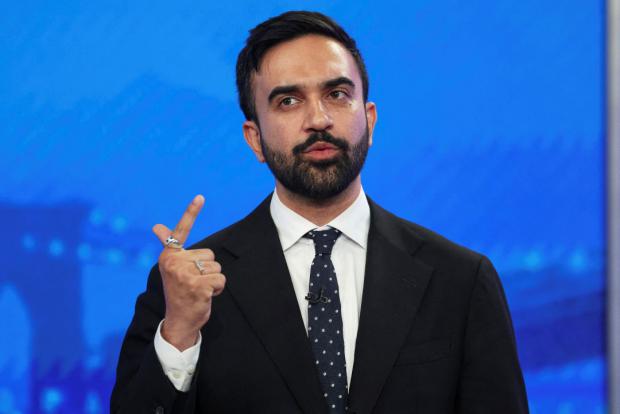
Breaking News
 The Paradox of Mamdani's Paradise
The Paradox of Mamdani's Paradise
 Stomach Acid Is Vital for Health
Stomach Acid Is Vital for Health
 Nancy Pelosi to Retire. Her Net Worth Surged 2,297% Since First Taking Office 38 Years Ago
Nancy Pelosi to Retire. Her Net Worth Surged 2,297% Since First Taking Office 38 Years Ago
Top Tech News
 Blue Origin New Glenn 2 Next Launch and How Many Launches in 2026 and 2027
Blue Origin New Glenn 2 Next Launch and How Many Launches in 2026 and 2027
 China's thorium reactor aims to fuse power and parity
China's thorium reactor aims to fuse power and parity
 Ancient way to create penicillin, a medicine from ancient era
Ancient way to create penicillin, a medicine from ancient era
 Goodbye, Cavities? Scientists Just Found a Way to Regrow Tooth Enamel
Goodbye, Cavities? Scientists Just Found a Way to Regrow Tooth Enamel
 Scientists Say They've Figured Out How to Transcribe Your Thoughts From an MRI Scan
Scientists Say They've Figured Out How to Transcribe Your Thoughts From an MRI Scan
 SanDisk stuffed 1 TB of storage into the smallest Type-C thumb drive ever
SanDisk stuffed 1 TB of storage into the smallest Type-C thumb drive ever
 Calling Dr. Grok. Can AI Do Better than Your Primary Physician?
Calling Dr. Grok. Can AI Do Better than Your Primary Physician?
 HUGE 32kWh LiFePO4 DIY Battery w/ 628Ah Cells! 90 Minute Build
HUGE 32kWh LiFePO4 DIY Battery w/ 628Ah Cells! 90 Minute Build
 What Has Bitcoin Become 17 Years After Satoshi Nakamoto Published The Whitepaper?
What Has Bitcoin Become 17 Years After Satoshi Nakamoto Published The Whitepaper?
The Paradox of Mamdani's Paradise

When Zohran Mamdani ran for mayor of New York City, his platform promised paradise: rent freezes on stabilized apartments, free city buses, universal childcare from six weeks to age five, city-run grocery stores not motivated by profit, and a minimum wage of $30 per hour by 2030, all funded by higher taxes on corporations and top earners.
Many of his promises are untenable, requiring levels of power that a city mayor simply doesn't have. But even if he did have the power to institute all of his radical policies, they'd bring incredibly grave unintended consequences. Paradoxically, the lower-income New Yorkers, renters, small business employees that he claims to be fighting for would be crushed most of all.
On paper these proposals are politically appealing, especially younger generations who inherited out of control deficits, debt, and inflation making life totally unaffordable. For many, the promises of free buses, rent freezes, universal childcare, and city-run grocery stores with affordable food are too tempting to resist. Low-information, economically illiterate voters fail to understand that they're impossible to fulfill, and if they were fulfilled, they would cause a ripple effect of destructive consequences.
First, there are the obvious legal and structural constraints. Mamdani cannot unilaterally freeze rents for stabilized apartments without control over the Rent Guidelines Board and possible changes to New York State law. Free buses require cooperation from the Metropolitan Transportation Authority and bond-holders, because fares are pledged revenue. And raising taxes on corporations and top-earners would need to clear resistance from the state legislature and the governor.
Despite the rhetoric, these policies involve complex legal, regulatory, and political processes with many layers and stakeholders. Voters who expect Mamdani to just flip a switch and activate these ideas as a benevolent dictator are in for a disappointment.
Even if he could flip a switch, the resulting disaster would be a massive wake-up call for the quixotic voters who believe that solving problems like high prices and unaffordable rent is as easy as a unilateral declaration from a government caretaker. Fiscal reality always wins in the end. The cost of universal childcare, free buses, and other proposed programs is enormous relative to the city's budget and revenue base.
Raising corporate taxes and top-earner surcharges may generate some revenue, but also entail risks of capital and business flight, reduced investment, and tax base erosion. Why would high earners, who are rich enough to go wherever they want and can often do their work from anywhere on a computer, stay somewhere that punishes them for doing so? There are many reasons that oversimplified slogans like "tax the rich" never seem to become policy.

 Digital Money Won't Feed You
Digital Money Won't Feed You
 Unbanked In A Connected World
Unbanked In A Connected World

